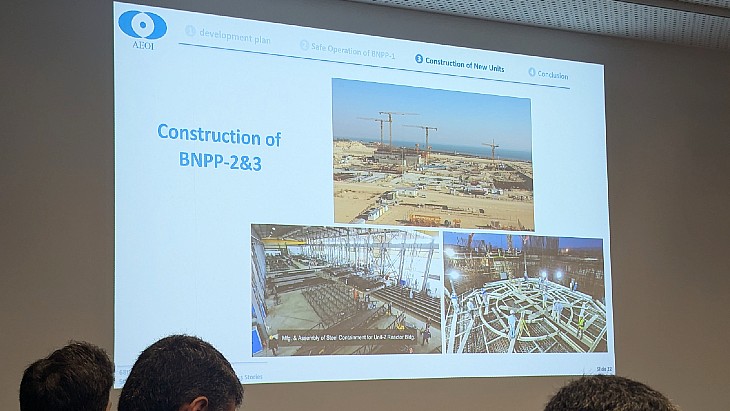Research institute for SMR-powered ships launched
.jpg)
Mokpo National University held the opening ceremony of its affiliated research institute, the SMR Ship Research Institute, on 2 July.
The ceremony was attended by more than 100 people, including representatives from Korea Hydro & Nuclear Power (KHNP), Korea Research Institute of Ships & Ocean Engineering Director, Korea Energy University, global shipyards such as Samsung Heavy Industries, HD Hyundai Samho, and HD Hyundai Mipo, international classification societies such as the American Bureau of Shipping, Det Norske Veritas, Lloyd's Register, and Korean Register of Shipping, local governments, and representatives and related parties from shipbuilding and marine industry companies and organisations.
Starting from 2050, all ships operating at sea will be required to use only carbon-free fuels, according to the International Maritime Organization (IMO) convention under the UN. "With such strong marine environmental regulations, ships that use carbon-free fuels and utilise advanced new technologies are in demand, and in particular, small modular reactor (SMR) ship technology is attracting attention as a core technology for the future marine industry," the university noted.
"In order to proactively respond to these demands, Mokpo National University established the SMR Ship Research Institute to build a cooperative network with domestic and international organisations and companies, including universities, research institutes, large shipbuilders, and international classification societies, and to conduct full-scale research," it continued.
The new research institute will focus on developing and commercialising SMR ship technology and also developing and operating world-class educational programmes to train specialised personnel.
"The establishment of the SMR Ship Research Institute marks an important milestone in the innovative convergence of Korea's world-class shipbuilding and nuclear industries, propelling Korea to become a global leader in accelerating carbon neutrality," KHNP President Whang Joo-ho said in a keynote speech. "KHNP will actively cooperate with the SMR Ship Research Institute to participate actively in the development and commercialisation of SMR-powered ships."
Regulatory hurdles
Nuclear power could transform the maritime industry with emissions-free shipping, whilst extending the life cycle of vessels and removing the uncertainty of fuel and refuelling infrastructure development, Lloyd's Register said in a new report. However, it said regulation and safety considerations must be addressed for its widespread commercial adoption.
The report - titled Fuel for Thought: Nuclear - assesses the opportunity presented by nuclear for commercial maritime given its proven track record in naval applications, with the study pointing to the role of new SMRs in bringing to market suitable low-maintenance reactors to meet the propulsion and energy requirements of commercial ships.
According to the report, the commercial relationships between shipowners and energy producers will be altered as power is likely to be leased from reactor owners, separating the shipowner from the complexities of licensing and operating nuclear technology.
"SMRs represent a leap forward in reactor design, emphasising safety, efficiency, and modularity for streamlined production," Lloyd's Register said. "As SMR technology matures and regulatory clarity increases, ship designs optimised for nuclear propulsion will emerge, ushering in a new era of efficient and environmentally friendly vessels."
Mark Tipping, director Power to X at Lloyd's Register, said the report "represents one of the first easily accessible overviews on the use of nuclear power in shipping, combining information from a wide range of sources into one report tailored for commercial shipping and the wider maritime value chain.
"Whilst its use in commercial shipping has been limited, by overcoming negative perceptions and a lack of investment levels, nuclear propulsion could provide immense value for the maritime sector in its decarbonisation journey, allowing for emissions free vessels with longer life cycles which require minimal refuelling infrastructure, or in best case scenarios limit the need entirely."
_92619.jpg)

_84504.jpg)






_66488.jpg)


